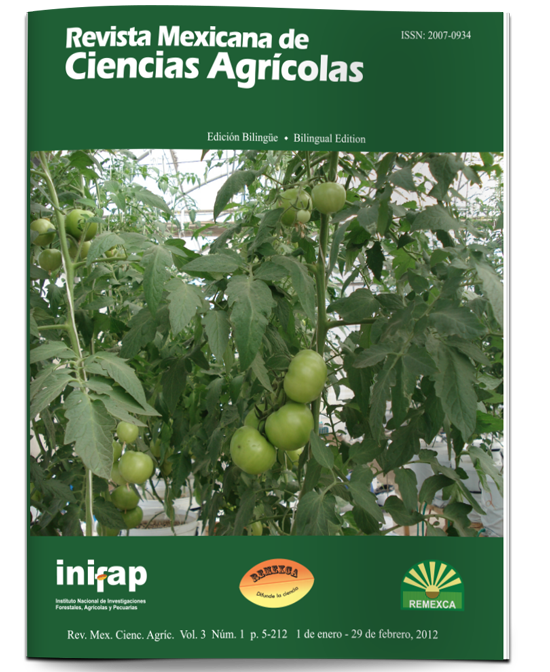Physalis ixocarpa physiological seed quality in terms of maturity at harvest and storage conditions
DOI:
https://doi.org/10.29312/remexca.v3i1.1481Keywords:
electrical conductivity, germination, relative humidity, respiration, temperatureAbstract
Seed deterioration during storage reduces germination and seedling establishment in the field. For Physalis ixocarpa Brot. seeds the levels of environmental factors that affect its germination longevity and physiological performance during storage, depending on the state of development at harvest are unknown. For this research, variety Chapingo seeds harvested at three stages of development were evaluated (45, 55 and 65 days after pollination), in three storage periods (0, 4 and 8 months) combined with five environments including two temperatures (23.8 and 5.3 °C) and two relative humidity levels (24 and 81%). It was found that, the seeds can maintain its initial germination capacity (70%) for at least 8 months when stored under low relative humidity (24%) or cold (5 °C), since the combination of high relative humidity (81%) and temperature of 23 °C cause degradation in the seeds. The deterioration is manifested in reduced germination from 70 to 29%, viability from 81 to 46%, radicle rate of emergence from 20.4 to 9.9 radicles per day, rate of emergence of the aerial part from 6.3 to 2.3 seedlings per day, respiration from 16.1 to 6.6 nmol CO2 g-1 s-1 and an increase in electrical conductivity from 32 to 97 μS cm-1 g-1. Seeds of 55 days of age have already reached physiological maturity, since they germinate with the same vigor that the seeds of 65 days. Immature seeds of 45 days do have ability to germinate, although 10% less than mature seed and with less vigor.
Downloads
Downloads
Published
How to Cite
Issue
Section
License
The authors who publish in Revista Mexicana de Ciencias Agrícolas accept the following conditions:
In accordance with copyright laws, Revista Mexicana de Ciencias Agrícolas recognizes and respects the authors’ moral right and ownership of property rights which will be transferred to the journal for dissemination in open access. Invariably, all the authors have to sign a letter of transfer of property rights and of originality of the article to Instituto Nacional de Investigaciones Forestales, Agrícolas y Pecuarias (INIFAP) [National Institute of Forestry, Agricultural and Livestock Research]. The author(s) must pay a fee for the reception of articles before proceeding to editorial review.
All the texts published by Revista Mexicana de Ciencias Agrícolas —with no exception— are distributed under a Creative Commons License Attribution-NonCommercial 4.0 International (CC BY-NC 4.0), which allows third parties to use the publication as long as the work’s authorship and its first publication in this journal are mentioned.
The author(s) can enter into independent and additional contractual agreements for the nonexclusive distribution of the version of the article published in Revista Mexicana de Ciencias Agrícolas (for example include it into an institutional repository or publish it in a book) as long as it is clearly and explicitly indicated that the work was published for the first time in Revista Mexicana de Ciencias Agrícolas.
For all the above, the authors shall send the Letter-transfer of Property Rights for the first publication duly filled in and signed by the author(s). This form must be sent as a PDF file to: revista_atm@yahoo.com.mx; cienciasagricola@inifap.gob.mx; remexca2017@gmail.
This work is licensed under a Creative Commons Attribution-Noncommercial 4.0 International license.



